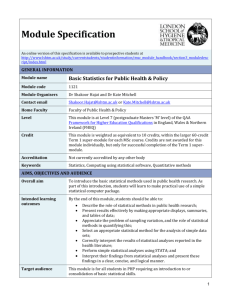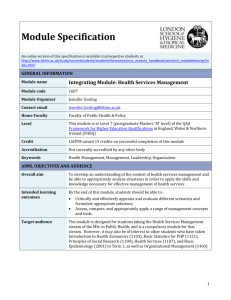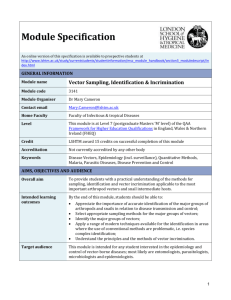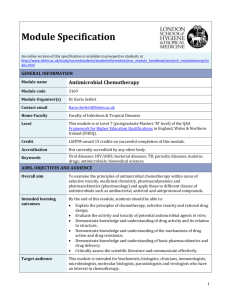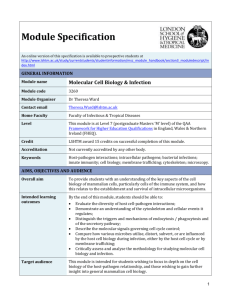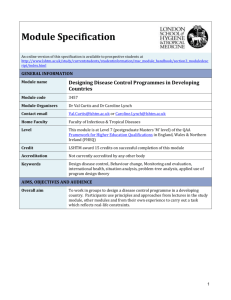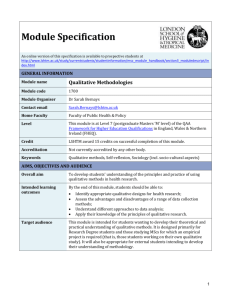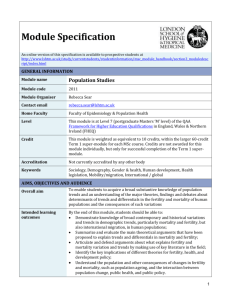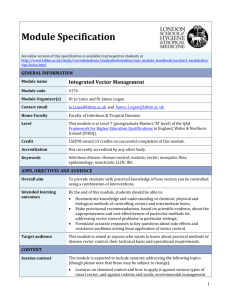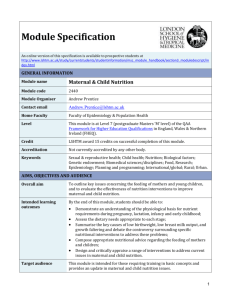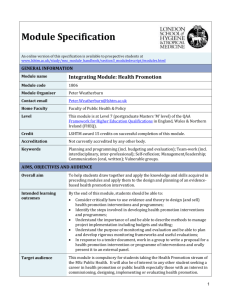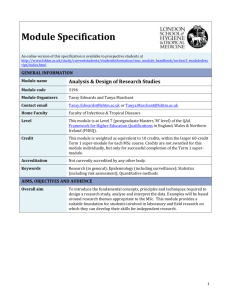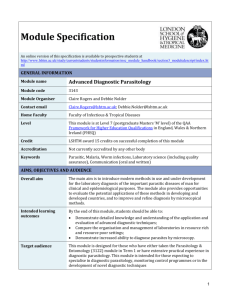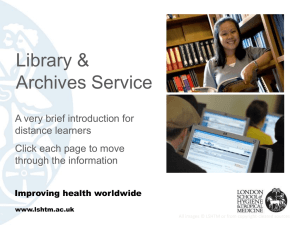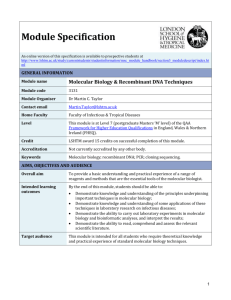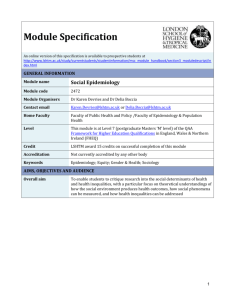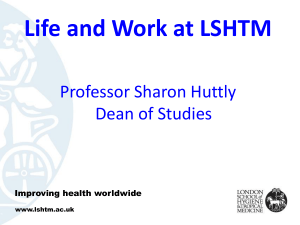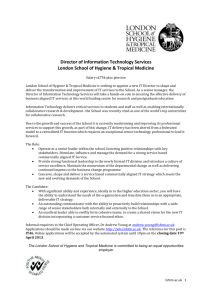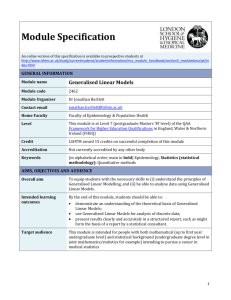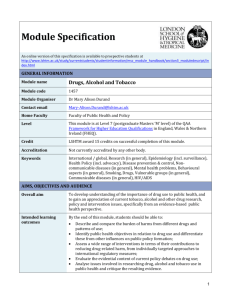1803 Sociological Approaches to Health Module Specification
advertisement
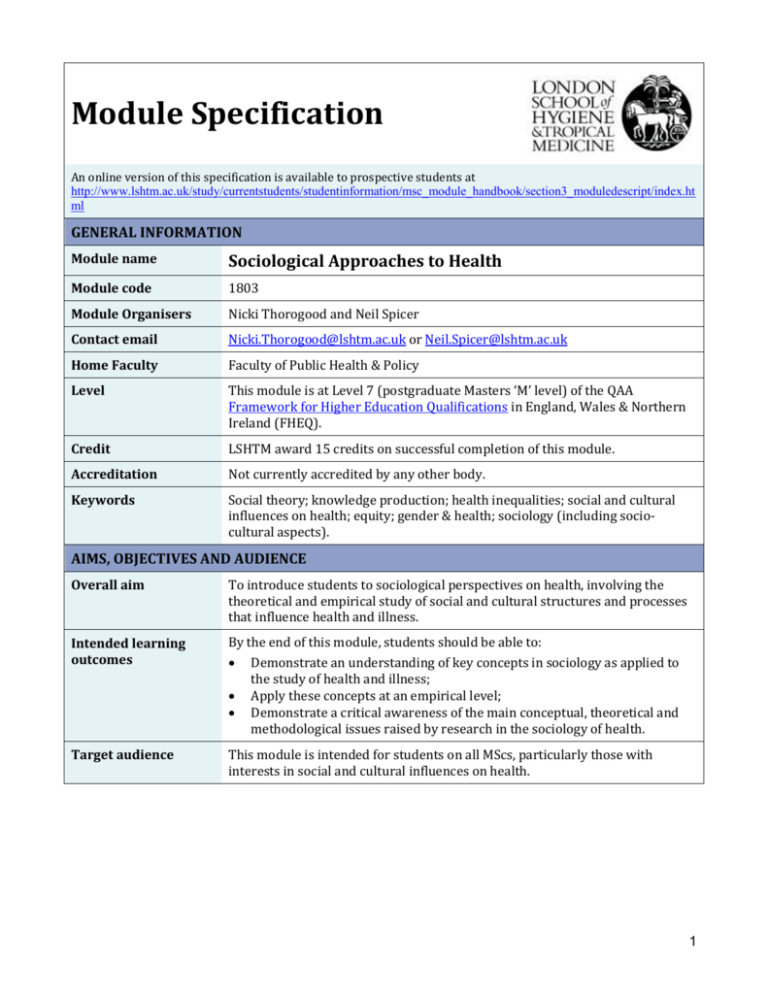
Module Specification An online version of this specification is available to prospective students at http://www.lshtm.ac.uk/study/currentstudents/studentinformation/msc_module_handbook/section3_moduledescript/index.ht ml GENERAL INFORMATION Module name Sociological Approaches to Health Module code 1803 Module Organisers Nicki Thorogood and Neil Spicer Contact email Nicki.Thorogood@lshtm.ac.uk or Neil.Spicer@lshtm.ac.uk Home Faculty Faculty of Public Health & Policy Level This module is at Level 7 (postgraduate Masters ‘M’ level) of the QAA Framework for Higher Education Qualifications in England, Wales & Northern Ireland (FHEQ). Credit LSHTM award 15 credits on successful completion of this module. Accreditation Not currently accredited by any other body. Keywords Social theory; knowledge production; health inequalities; social and cultural influences on health; equity; gender & health; sociology (including sociocultural aspects). AIMS, OBJECTIVES AND AUDIENCE Overall aim To introduce students to sociological perspectives on health, involving the theoretical and empirical study of social and cultural structures and processes that influence health and illness. Intended learning outcomes By the end of this module, students should be able to: Demonstrate an understanding of key concepts in sociology as applied to the study of health and illness; Apply these concepts at an empirical level; Demonstrate a critical awareness of the main conceptual, theoretical and methodological issues raised by research in the sociology of health. Target audience This module is intended for students on all MScs, particularly those with interests in social and cultural influences on health. 1 CONTENT Session content The module is expected to include sessions addressing the following topics (though please note that these may be subject to change): The critical appraisal of how ‘knowledge’ is produced: an introduction to discourse and semiotic analysis and its application to current issues for public health; The social production of health and ill health: Historical overview of relationships between social organisation and health. Biomedicine and critiques. How social, cultural and psychological processes impact on health status and access to health services. Understanding the concept of mental health and illness; Examining inequalities in health: Examination of the research which links social factors such as social class, ethnicity, gender and disability to differential health outcomes. The role of social support and ‘social capital’. Conceptual and methodological debates about the literature; Medicine, risk and society: Medicalisation and the role of medicine in society. Conceptions of risk and risk behaviour. TEACHING, LEARNING AND ASSESSMENT Study resources provided or required A Module Handbook including reading lists and a copy of key readings will be provided. Teaching and learning methods Nine sessions provide overviews of the material listed above. These are generally lectures by subject area specialists followed by seminars in which students are encouraged to discuss and explore their own views, ideas and responses to the case studies from the topics covered. Two sessions are run as a whole group workshop on discourse and semiotic analysis. There are also several documentary films shown to support the topics being discussed. The remainder of the time will be spent in private study. Students will be expected to read and discuss relatively large volumes of material. The private study time must therefore be considered an integral part of the module. Assessment details Formal assessment is by an individual essay of 1,500 words. One question to be selected from a list of questions based on the lecture/seminar topics. For students who are required to re-sit, or granted a deferral or new attempt, the task will be to submit a 1,500 word essay taking (in the case of resubmissions or re-sits) a different question from the same list. Assessment dates Assessments will be due by midday of the final day of the module. For students who are required to re-sit, or granted a deferral or new attempt, the next assessment deadline will be the standard School-recommended date. Language of study and assessment English (please see ‘English language requirements’ below regarding the standard required for entry). 2 TIMING AND MODE OF STUDY Duration The module runs for 5 weeks at 2.5 days per week; this module runs between Monday morning and Wednesday lunchtime. Dates For 2015-15, the module will start on Monday 11 January 2016 and finish on Wednesday 10 February 2016. Timetable slot The module runs in LSHTM timetable slot C1. Mode of Study The module is taught face-to-face in London. Both full-time and part-time students follow the same schedule. For full-time students, other LSHTM modules are available in the other half of the week for the C and D slots. Learning time The notional learning time for the module totals 150 hours, consisting of: Contact time ≈ 30 hours Directed self-study ≈ 30 hours Self-directed learning ≈ 40 hours Assessment, review and revision ≈ 50 hours. APPLICATION, ADMISSION AND FEES Pre-requisites It is desirable, but not essential, that students should have taken the Principles of Social Research (1104) module or be able to demonstrate equivalent knowledge. English language requirements A strong command of the English language is necessary to benefit from studying the module. Applicants whose first language is not English or whose prior university studies have not been conducted wholly in English must fulfil LSHTM’s English language requirements, with an acceptable score in an approved test taken in the two years prior to entry. Applicants may be asked to take a test even if the standard conditions have been met. Student numbers Student numbers are typically 15 - 25 per year; numbers may be capped due to limitations in facilities or staffing. Student selection Preference will be given to LSHTM MSc students and LSHTM research degree students. Other applicants meeting the entry criteria will usually be offered a place in the order applications are received, until any cap on numbers is reached. Applicants may be placed on a waiting list and given priority the next time the module is run. Partial Registration (partial participation) by LSHTM research degree students is allowed for this module. Fees For registered LSHTM MSc students, fees for the module are included within MSc fees (given on individual course prospectus pages). If registering specifically for this module, as a stand-alone short course, individual module fees will apply. Tuition fees must be paid in full before commencing the module, or by any fee deadline set by the Registry. Scholarships Scholarships are not available for individual modules. Some potential sources of funding are detailed on the LSHTM website. 3 Admission deadlines For 2015-16: For registered LSHTM MSc students, the module choice deadline (for Term 2 and 3 modules) is Friday 20 November 2015. If registering specifically for this module, applications may be made at any time but, as places are limited, early application is recommended. All applications should be submitted by, at latest, 8 weeks prior to the start of the module. Formal registration will take place on the morning of the first day of the module. ABOUT THIS DOCUMENT This module specification applies for the academic year 2015-16 Last revised: 23 June 2014 by Nicki Thorogood and Neil Spicer. Minor amendments SB 20th July 15 London School of Hygiene & Tropical Medicine, Keppel St., London WC1E 7HT. www.lshtm.ac.uk 4

